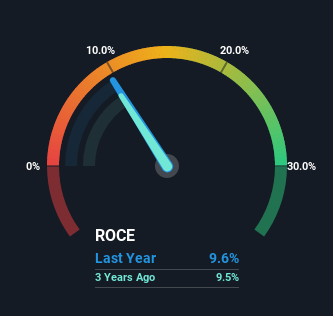- Hong Kong
- /
- Healthcare Services
- /
- SEHK:1110
Kingworld Medicines Group's (HKG:1110) Returns On Capital Not Reflecting Well On The Business

Ignoring the stock price of a company, what are the underlying trends that tell us a business is past the growth phase? More often than not, we'll see a declining return on capital employed (ROCE) and a declining amount of capital employed. This indicates to us that the business is not only shrinking the size of its net assets, but its returns are falling as well. So after we looked into Kingworld Medicines Group (HKG:1110), the trends above didn't look too great.
What is Return On Capital Employed (ROCE)?
For those who don't know, ROCE is a measure of a company's yearly pre-tax profit (its return), relative to the capital employed in the business. To calculate this metric for Kingworld Medicines Group, this is the formula:
Return on Capital Employed = Earnings Before Interest and Tax (EBIT) ÷ (Total Assets - Current Liabilities)
0.096 = CN¥71m ÷ (CN¥1.2b - CN¥474m) (Based on the trailing twelve months to December 2021).
Therefore, Kingworld Medicines Group has an ROCE of 9.6%. On its own, that's a low figure but it's around the 12% average generated by the Healthcare industry.
See our latest analysis for Kingworld Medicines Group

Historical performance is a great place to start when researching a stock so above you can see the gauge for Kingworld Medicines Group's ROCE against it's prior returns. If you want to delve into the historical earnings, revenue and cash flow of Kingworld Medicines Group, check out these free graphs here.
What Does the ROCE Trend For Kingworld Medicines Group Tell Us?
We are a bit worried about the trend of returns on capital at Kingworld Medicines Group. To be more specific, the ROCE was 15% five years ago, but since then it has dropped noticeably. On top of that, it's worth noting that the amount of capital employed within the business has remained relatively steady. This combination can be indicative of a mature business that still has areas to deploy capital, but the returns received aren't as high due potentially to new competition or smaller margins. If these trends continue, we wouldn't expect Kingworld Medicines Group to turn into a multi-bagger.
On a related note, Kingworld Medicines Group has decreased its current liabilities to 39% of total assets. That could partly explain why the ROCE has dropped. Effectively this means their suppliers or short-term creditors are funding less of the business, which reduces some elements of risk. Some would claim this reduces the business' efficiency at generating ROCE since it is now funding more of the operations with its own money.
Our Take On Kingworld Medicines Group's ROCE
In the end, the trend of lower returns on the same amount of capital isn't typically an indication that we're looking at a growth stock. Long term shareholders who've owned the stock over the last five years have experienced a 60% depreciation in their investment, so it appears the market might not like these trends either. Unless there is a shift to a more positive trajectory in these metrics, we would look elsewhere.
On a final note, we found 3 warning signs for Kingworld Medicines Group (1 is significant) you should be aware of.
While Kingworld Medicines Group isn't earning the highest return, check out this free list of companies that are earning high returns on equity with solid balance sheets.
Valuation is complex, but we're here to simplify it.
Discover if Kingworld Medicines Group might be undervalued or overvalued with our detailed analysis, featuring fair value estimates, potential risks, dividends, insider trades, and its financial condition.
Access Free AnalysisHave feedback on this article? Concerned about the content? Get in touch with us directly. Alternatively, email editorial-team (at) simplywallst.com.
This article by Simply Wall St is general in nature. We provide commentary based on historical data and analyst forecasts only using an unbiased methodology and our articles are not intended to be financial advice. It does not constitute a recommendation to buy or sell any stock, and does not take account of your objectives, or your financial situation. We aim to bring you long-term focused analysis driven by fundamental data. Note that our analysis may not factor in the latest price-sensitive company announcements or qualitative material. Simply Wall St has no position in any stocks mentioned.
About SEHK:1110
Kingworld Medicines Group
An investment holding company, primarily engages in the distribution and sale of branded imported pharmaceutical and healthcare products.
Excellent balance sheet, good value and pays a dividend.
Market Insights
Community Narratives



